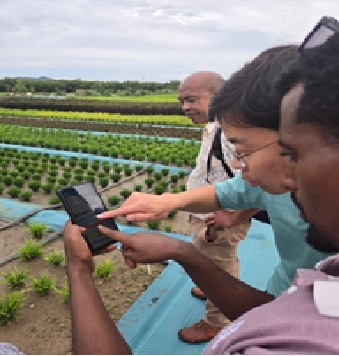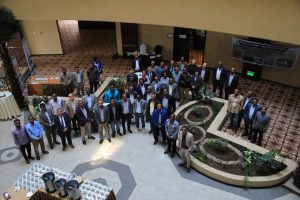
A capacity building training workshop from August 18th–31st, 2024, was held in Beijing, China, bringing together representatives from three pilot countries: Ethiopia, Madagascar, and Mozambique. The training workshop provided a comprehensive overview of the project and included technical training on using the CropWatch Cloud platform to monitor crop conditions, assess crop stress, and evaluate production at various scales. Participants engaged in hands-on training covering topics such as crop type mapping yield estimation, irrigation sensing, and field boundary establishment, and a field trip to local farms allowed attendees to test mobile applications for on-the-ground crop assessment.
Ethiopian participants, Mr. Tadesse Anberbir and Mr. Melkamu Demelash, received specialized training aimed at enhancing their capacity to utilize and localize the CropWatch platform for Ethiopia. The training is designed to improve access to digital early warning systems for climatic shocks and to provide geo-referenced production forecasts. By the end of the ten-day program, these experts gain hands on experience to implement the CropWatch Platform in Ethiopia and train additional local experts, mainly focusing on crop type mapping and yield estimation at national, regional, zonal, woreda, and field levels.
The second phase of the workshop took place from September 2-6, 2024, at the Ramada Hotel in Addis Ababa, Ethiopia, supported by the World Bank and the Ethiopian Institute of Agricultural Research (EIAR). The session showcased initial results from the CropWatch Cloud platform for digital crop monitoring and yield estimation at Bejing China.
On the workshop, Dr. Girma Mamo from EIAR welcomed participants and emphasized the workshop’s goals: enhancing agro-meteorological bulletins and digitizing crop-related data. On the other hand, Dr. Hongwei Zeng from the CropWatch team highlighted the platform’s innovative features.
Next, Mr. Tadesse Anberber and Mr. Melkamu Demelash presented the results and overview of the CropWatch Beijing Workshop, focusing on crop type mapping, agro meteorological bulletins, and analytics, and likewise, Dr. Assfaw Kebede presented advanced applications of the CropWatch Cloud platform in Ethiopia.
Then, from September 3–5, 2024, attendees conducted data collection campaigns at Debre Zeit and Melkassa agricultural research centers using the GVG and tested Field Watch mobile apps for crop health and yield estimation mainly on wheat crops. Additionally, a drone was used to collect images to test maize tassel detection and crop type mapping.
In general, this initiative aims to empower the Ethiopian Ministry of Agriculture (MoA) and EIAR to produce regular crop monitoring and agricultural production updates accessible to the public. The project will support government stakeholders in developing actionable responses to food security challenges, contributing to data-driven policies for global resilience against shocks. The project will also support relevant government stakeholders in developing actionable response scenarios to address food security shocks. The methods and data created by this project will contribute to better knowledge about data-driven policies for food security response and resilience to shocks globally. This collaborative effort underscores the importance of integrating cutting-edge technology in agriculture to achieve sustainable food security.


